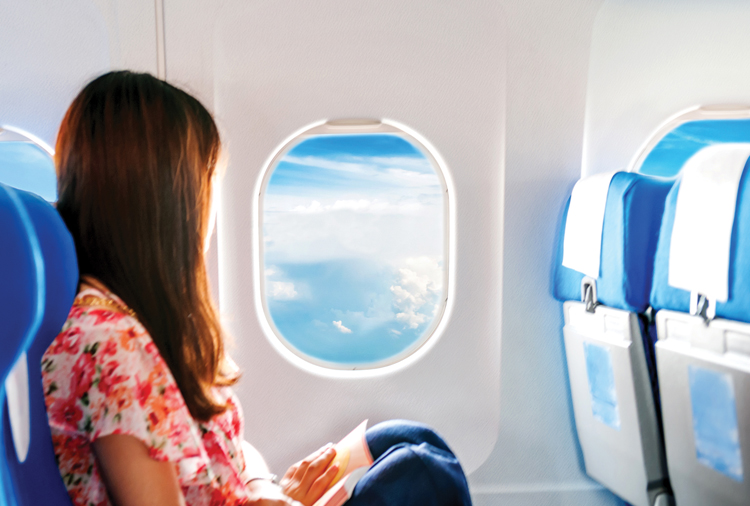
Your ears during plane travel
You hear the pilot announcing that the plane is beginning its descent, but your ears have already let you know that something is happening. Sounds have become muffled and your ears are uncomfortable or painful. You are suffering from barotrauma. Many air travelers have pain in their ears when they fly, mainly at takeoff and landing.
What does it feel like?
Barotrauma can occur in one ear or in both. It causes one or more of the following symptoms:
- Earache
- A feeling that the ear is full or blocked
- Dizziness
- Slight hearing loss
- Ringing or buzzing in the ears
Earaches while flying usually cause only temporary discomfort. They can also cause fluid to accumulate, making your feel like your ears are completely blocked.
Why do we feel pressure in our ears?
Usually, the air pressure in your middle ear is the same as outside your body. The Eustachian tubes are responsible for maintaining this balance, but if the tubes are blocked, the air pressure can no longer be balanced.
When an airplane rises or descends the air pressure in the cabin changes rapidly and your Eustachian tubes do not react quickly enough. You can also experience a mild case of barotrauma in an elevator or riding in a car in the mountains.
Tips to avoid the effects of pressure in the ears
Yawn and swallow during takeoff and descent. Yawning and swallowing activate the muscles that open the Eustachian tubes. You can drink water, suck on hard candies or chew gum to help you swallow.
Drink plenty of water to prevent dehydration. Staying hydrated will prevent irritation in the nasal passages and the throat and will keep the Eustachian tubes working properly.
Do the Valsalva manoeuver. Close your mouth, pinch your nose and blow gently, as if you were blowing your nose. Repeat several times, especially during descent, to equalize the pressure between your ears and the cabin. Do not blow too hard, which might cause ear pain.
Do not sleep during takeoff and descent. If you stay awake during takeoffs and descents, you can perform the techniques that will relieve the pressure in your ears.
Decongestants. If you have nasal congestion, from a cold for example, sinusitis or an ear infection, ear discomfort might be amplified. Use a nasal or oral decongestant to keep congestion at bay and to allow your Eustachian tubes to open. Take the decongestant 30 minutes to an hour before departing or landing. Ask your doctor or pharmacist for advice to choose a decongestant.
Tinnitus
If you suffer from tinnitus, or ringing in the ears, it may seem to intensify when you fly in an airplane. Distract yourself when flying: listen to music or watch movies to keep your mind from focusing on the tinnitus. If you get nervous when flying, relaxation exercises may help you relax. Avoid stress and worry to decrease the effects of tinnitus.
Precaution: alcohol and caffeine
It is not recommended to drink alcohol or caffeine when flying because they can cause dehydration. They also constrict the blood vessels, which can increase the risk of ruptured capillaries.
Effects of pressure in children’s ears
Children may also feel the effects of pressure in their ears. Here are some tips to help them:
Encourage them to swallow. Give a baby or child a drink during takeoff and descent to help them swallow. A pacifier can also be useful. Older children can try chewing gum, drinking with a straw or making bubbles with a straw.
Avoid decongestants. Decongestants are not recommended for young children.
By Christian Bruneau, audioprosthetist, Groupe Forget

